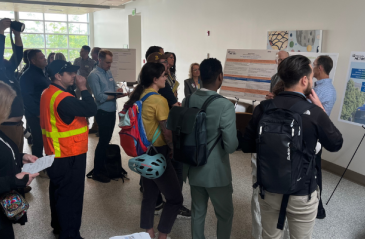
The information barriers holding back climate action and how to break them

Brad Carson was the only Congressman who voted for the Iraq War and then go fight in it
Share articleAs under-secretary of defense, Brad Carson implemented sweeping reforms to the military
Share articleTransformative leaders have 'to be the first person out of the trench', says Brad Carson
Share articleWe put our vision for government into practice through learning partner projects that align with our values and help reimagine government so that it works for everyone.
Bucking the trend is something of a lifelong habit for Brad Carson.
It started when he became the first student from his college in 75 years to be made a Rhodes Scholar, and has continued through a long and distinguished professional career. Carson, for example, didn't just vote for the Iraq War but volunteered to serve, earning a bronze star for his efforts.
And as under secretary of defense for personnel and readiness, he didn't meekly accept the status quo but instead introduced some of the most sweeping personnel changes to the military and civilian workforce in 50 years, including opening up all combat positions to women and making competence - not seniority - the critical factor in promotions.
Carson is understated in style and is not one for boasting about his achievements. Take his decision to deploy to Iraq, for example. This, he says, was simply a case of having the courage of your convictions and honouring a campaign promise.
“I was the only person able to vote for it and then go fight in it,” he explains. “There were moments of hardship out there, but it was also very rewarding to be part of such a big collective effort. You can be leading people in sometimes difficult conditions - people from all walks of life, some educated, some not, some with ambitions beyond the military and some wanting a career in it - but nonetheless they have something similar in them about commitment to country and duty.”
Carson served as an intelligence officer in the US Navy, where he helped investigate explosives and other weapons - and it was enriching in a number of ways. Of particular pertinence was his realisation that, as a leader, you have to treat people differently.
“Of course there are uniform rules and a sense of fairness, but people's temperaments and their reactions to stress can be so different you have to be sympathetic,” he explains. “You can see things or do things that some will be devastated by, whereas others can process them without it changing their world. So you have to deal with people individually while still having a common mission, and that's what the military is all about.”
The military theatre must have felt a long way - both literally and figuratively - from Carson's home in Oklahoma. It was there he was born and raised, starting his professional life as a lawyer working for a top law firm. It was also there, while working for low-income clients and helping them with things like bankruptcy or negotiating healthcare expenses, that he thought of stepping into the public arena.
“This was very meaningful work, but I soon came to realise that - while you could help people on a one on, one off basis, to make a bigger impact - you have to look at the invisible rules and regulations that cast a web over their daily lives,” he recalls. “This is what led me to go more formally into the public sector in order to try and change that web for the better.”
His first taste of government life was as a White House Fellow - a programme which allows high-flying private sector professionals to sample life at the top end of government for a year. In Carson's case he was sent to the Department of Defense (DoD) to work with the under secretary, coincidentally the same role he would himself fill some 25 years later. “I saw a lot interactions with people from Congress and felt you could really make an impact if you had a thoughtful approach to these matters through elected office,” he says.
He returned home to Oklahoma and ran for Congress, where he soon discovered a taste for the campaign trail. “For me, the most fun aspect of politics is the campaigning,” he says. “It takes you to these small towns where you can meet people who are barely getting by or who are tremendously committed to changing the world around them. I loved going to these towns - often at night - where the total population was under 1,000, but half of them would be there to hear you talk from the back of a truck. So you really feel part of democracy and it is a throwback, in some ways, to how politics was 60 years ago.”
Carson was elected twice, but life as a freshman member of Congress was not entirely to his liking. “It is very difficult to make an impact in a hierarchical institution like Congress,” he points out. “So you can be very ambitious and chomping on the bit to do certain things, but it can be hard to get traction. At the same time, back home in your district you have an incredible pulpit to talk about things you believe are important and can change the direction of your state, region or even the country if you want to. You're given a platform from which to speak, and this I think is probably the most powerful aspect of the job for a freshman member of Congress. Over time you can accumulate each year modest amounts of power. Right now, the people I was elected with 15 years ago hold positions of influence, but it is a long haul.”
Another issue is the how two-year terms mean that a member of Congress is always running for office. “It's a real challenge,” he says. “You're always raising money - the day after you're elected you're raising money for the next one.” But an even bigger issue is the lack of time, he adds.
“You're so busy with the matters of the day, you have no way to invest in your own human capital. I remember reading a study that came out when I was first elected that said the average Congressman only reads about 17 minutes a day. So if you're confronted with foreign policy issues or arcane tax proposals or obscure healthcare policy matters and yet you're only reading for 17 minutes a day, you really have to carve out some time to get smart about issues - otherwise you just end up following the herd.”
Fast-forward a decade and Carson, on his return from Iraq, was settled in academia while at the same time trying to politely rebuff repeated entreaties to join the Obama administration. Obama, though, was persistent - they had first gotten to know each other while running for the Senate in 2004, with Carson an early supporter of his presidential campaign - and eventually Carson agreed to become general counsel of the US army.
Although he signed on for a year, two years on he became under secretary, which meant he was the top official overseeing military and civilian personnel policy and total force readiness. It was quite a responsibility. The DoD, after all, is the world's largest employer with more than 700,000 civilians and more than 2 million men and women in uniform on its payroll.
Although Carson says that the only organisation in the world which can match its reach and size is the Vatican, he did not flinch from its scale and complexity. Instead, he embraced a radical reform initiative - Force of the Future - which saw him develop a broad portfolio of innovative proposals to modernise the department's civilian and military personnel systems, including reforming the military retirement system for the first time in 70 years, strengthening maternity leave, and much else besides.
So how did he do it? How did he navigate the Pentagon's corridors of power to successfully achieve lasting change? “Part of it is to have ambition,” he replies. “There were things I saw that I thought should be different, and I wanted to make them different. Lots of people I talked to said basically there was lots of dysfunction but it is as good as it can ever be, as such a huge operation is going to be dysfunctional in some way or is not going to get it right all the time. For me, that was never an acceptable answer. So it is important to have the ambition to make a difference.”
He goes on to say that you have to be willing to be the first to speak out. “You have to be the first person out of the trench on lots of issues,” he says. “But if you want to achieve change at an organisation as complex as the DoD, then you're going to be a controversial person and this can sometimes be unpleasant. But you have to be a personality who can weather that storm and push the reforms through as rapidly as possible. This is because if you take a more evolutionary approach, then the forces of the bureaucracy will beat you back.”
And of course, his naval service certainly helped. “I knew the rules, I knew the regulations and it also gave me credibility - I wasn't just some kind of civilian interloper but was actually part of their world, having served in the military myself.”
Carson spent five years at the DoD - he is now back in the private sector where he is juggling a number of commitments, including serving as a senior advisor to The Boston Consulting Group - but it is clear his is a legacy which will long endure. So what's his advice to others seeking to achieve transformational change? “You need to have a good understanding of how a large bureaucracy actually works,” he concludes. “Many leaders have subject-matter expertise without having an X-ray of their organisation itself, but it is really important. Only then will you be able to take an idea through from blueprint to reality.”












